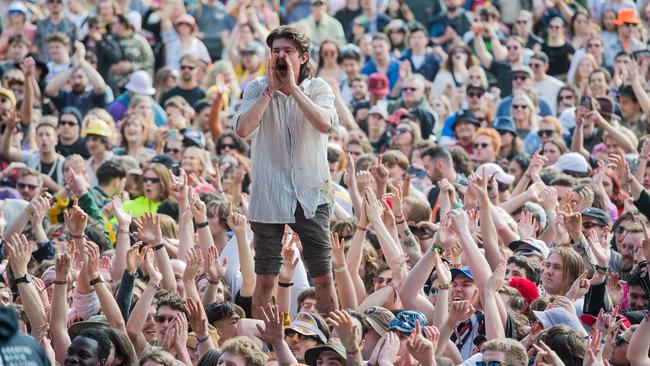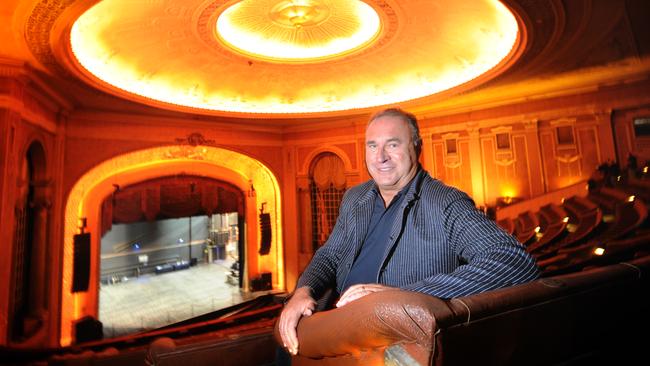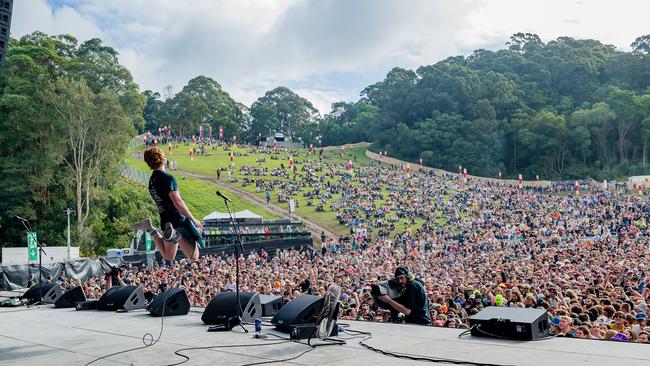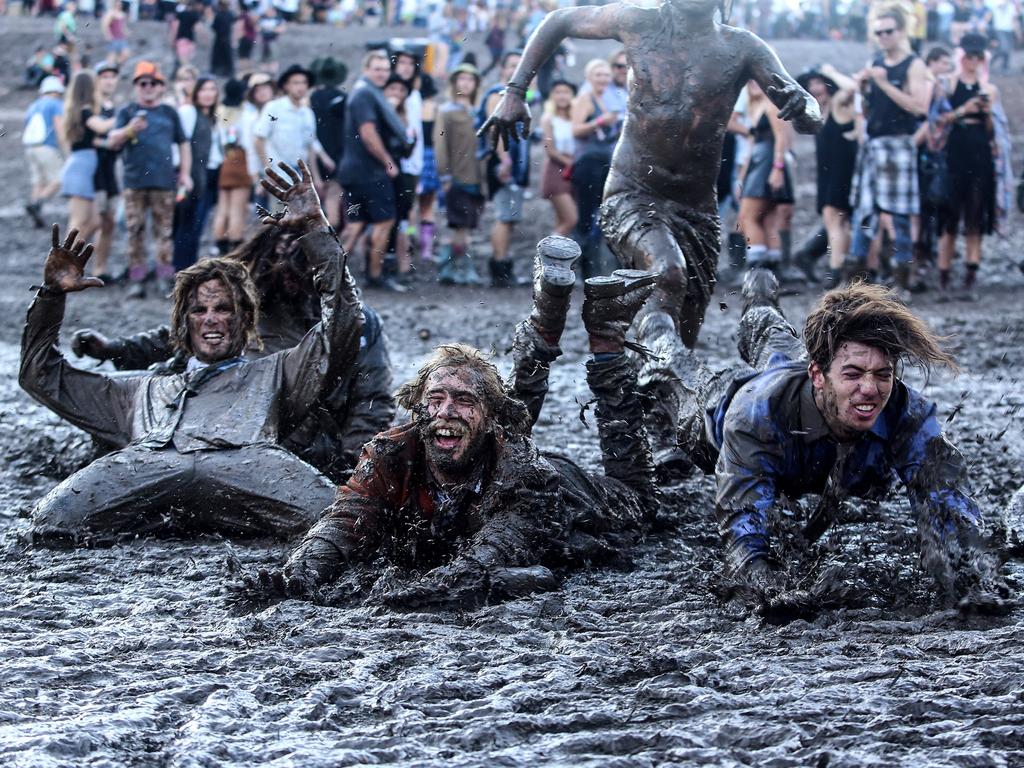‘Sloppy journalism’, ‘weak’: music sector responds to Four Corners’ report on Live Nation
A Four Corners investigation into the live music sector has been described as ‘nonsensical’, ‘counter-productive’ and ‘misleading’ by the chief executive of the sector’s peak body.

A Four Corners investigation into the live music sector has been rubbished as “sloppy journalism” by a senior executive at Live Nation Australasia, and described as “nonsensical” and “misleading” by the chief executive of the sector’s peak body.
On Monday night, journalist Avani Dias presented a report that explored the Australian live music sector, which has undergone a tumultuous few years since the Covid pandemic of 2020.
The program, titled Music for Sale, featured interviewees including Midnight Oil frontman Peter Garrett and veteran concert promoter Michael Chugg, whose animus toward Live Nation framed a report that was highly critical of its business practices, which includes owning interests in concert promotion, music venues, ticketing and booking agencies.
“Without nurturing your local artists … we’re finding out that we’re not hearing our songs. We’re not hearing the things that connect us to the place that we’re in,” said Garrett, 71. “For me, that’s a healthy country, when we’re listening to our songwriters and watching our performers. I don’t think Live Nation cares at all about Australian artists.”
When asked how the 2010 entry of Live Nation had affected the Australian live sector, Chugg, 77, told Dias, “Well, they f..ked it up, basically. They pay too much for acts; they don’t care about whether they make a profit or loss – it’s all about their share prices.”
The program spent much of its runtime focusing on allegations of excessive industry power and influence held by Live Nation, including its ownership of Ticketmaster, the ticketing services company it purchased in 2010.
The US-based entertainment company declined to offer an interviewee to appear on camera with Dias.
In an interview with The Australian on Tuesday morning, Live Nation Australasia chairman Michael Coppel said, “What I saw disturbed me a lot, unfortunately. I thought it was sloppy journalism; I thought it was trying to find a lot of things that were wrong, and pinning it on a particular donkey.”
Coppel joined Live Nation in 2012 when his Melbourne-based concert promotion business, Michael Coppel Presents, was acquired by the US company in a joint venture. He worked as its chief executive and president before becoming chairman in 2017.

According to Coppel, the report’s premise “that Live Nation is dominating the Australian live performance industry is very, very far from the truth.”
The company’s domestic competitors among concert promoters include Frontier Touring – which in 2019 formed a joint venture with US-based promoter AEG – and TEG, which runs rival ticketing service Ticketek and was acquired by US-based private equity company Silver Lake in 2019.
“There are three major players, and probably 10 or 12 secondary players,” said Coppel, 75. “It’s a very competitive industry; it’s more competitive than the airlines, the banks, the supermarkets. To see a program spending 45 minutes blaming all the ills in the industry on us, without explaining how they have come about, leaves me cold.”
Headquartered in Los Angeles and publicly listed on the New York Stock Exchange, Live Nation’s local interests includes ownership in venues such as The Fortitude Music Hall (Brisbane), Palais Theatre (Melbourne) and Hindley Street Music Hall (Adelaide).
As well, it owns music festival brands such as Splendour in the Grass – which was cancelled this year due to poor ticket sales — and Spilt Milk and Harvest Rock, which were both postponed this year due to difficulty securing competitive line-ups in a tough market for multi-genre events.
Live Nation’s upcoming tour schedule includes performances from artists such as Amy Shark, Troye Sivan, Travis Scott, Glass Animals, Crowded House and Coldplay. The company is also presenting stadium-level shows for The Weeknd and Travis Scott this month, as well as Oasis and Green Day next year.
Coppel’s lukewarm response, meanwhile, was not unique among senior music industry figures.
One veteran concert promoter, who did not wish to be identified, told The Australian the report was “unfair because they were picking on one company; they missed the point”, while another industry executive categorised the program as “weak; it didn’t really land a punch”, and compared it to high-school level journalism.

Evelyn Richardson, the chief executive of Live Performance Australia, was scathing of Dias’ report.
“There’s no doubt some parts of the music industry are under real pressure, but to blame all of those problems on a single company is nonsensical and counter-productive to addressing the real issues at stake,” said Richardson on Tuesday. “Many of the challenges facing the Australian industry are being experienced globally.”
The LPA is the peak body for the live arts and entertainment industry, including major promoters and festival organisers. Its response noted that the sector is highly competitive, with no single company dominating the market, as asserted by Four Corners.
“There are structural challenges and transitions affecting all levels of the live music industry including huge increases in production and touring costs; new ways that audiences are discovering and experiencing music including through streaming platforms; and changing audience preferences for the kind of live music experience they want,” said Richardson.
“Four Corners could have looked at some of these issues in a more thoughtful way instead of the misleading reporting we saw last night,” she said.

Asked whether declining Dias’ request for an interview on camera was the right call, Coppel replied, “I think so. Their narrative was ‘explosive revelations; consumers being ripped off, hidden fees, industry in chaos and in crisis.’ If we’d elected to appear on camera, it would have been selectively edited; it would have been a ‘gotcha’ moment.”
As for how Live Nation was portrayed on Four Corners, Coppel said, “I think the average punter would walk away saying, ‘Oh, these guys are crooks. What’s going on here?’”
“You couldn’t but walk away thinking, ‘Geez, this place is falling to pieces, and this company’s responsible for it. The Americans have moved in, established a beachhead, and are taking over the terrain’,” he said. “It was calculated to create a very negative image.”
In response to Chugg’s observations about how Live Nation had affected the live music sector since arriving 14 years ago, Coppel said, “I found it a fabulous comment. Point one: we pay too much to the acts. Okay, so we should pay acts less?”
“Point two: I wouldn’t say I’m a genius at the stock exchange, but if you’re losing money as a company, your share price goes down; if you’re making money, if you’re successful and your business is expanding, your share price goes up,” he said. “I don’t see how we can be engaged in loss-making activities and our share price goes up. It leaves me a little bit bewildered as to how that mechanic can work.”
In response to The Australian on Tuesday, ABC News director Justin Stevens said, “Avani Dias and the Four Corners team are thorough and ethical journalists and the ABC stands behind their work.”
In a further statement, an ABC spokesman said that program was “important public interest journalism scrutinising issues that Australians have a right to be fully informed about. Live Nation is a dominant player in the Australian live music industry and has received millions in taxpayer-funded government grants.”
“The report was the result of months of work and the Four Corners team spoke to dozens of people across the industry for its research to represent their perspectives in the story,” said the ABC in a statement. “It included the views of a range of industry insiders and leading musicians. The team requested an interview with Live Nation more than a month in advance of the story and put detailed questions to them, and its responses were included.”





To join the conversation, please log in. Don't have an account? Register
Join the conversation, you are commenting as Logout